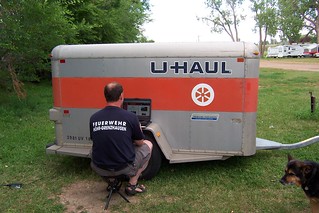In May 1999, two America Online volunteers in the USA filed a class action lawsuit against AOL, claiming that AOL online volunteers performed work equivalent to employees and thus should be compensated according to the Fair Labor Standards Act.
Yes, a for-profit business involved online volunteers. It happened all the time. It still happens. These online volunteers moderated chat rooms and message boards, kept online areas up-to-date, helped new users, helped with technical issues, etc. In return, they got perks like free AOL access.
AOL was the Facebook of its day; if you didn’t have an AOL keyword, you weren’t really on the the Internet. Back then, TV commercials didn’t just say a company’s web site address, they ALSO said a company’s AOL user name. And at its peak, AOL had more than 14,000 online volunteers.
But something went wrong. Maybe it was when the volunteers started looking at AOL’s massive profits. Maybe it was when some long-term volunteers were dismissed and they felt cheated. Whatever it was, volunteers started getting angry. The plaintiffs detailed how AOL’s online volunteers — called Community Leaders — had to undergo a thorough, three-month training program and were required to file timecards for shifts, work at least four hours per week, and submit detailed reports outlining their work activity during each shift. In response, AOL began drastically reducing volunteer responsibilities. According to Wikipedia, by 2000, nearly all Community Leaders had lost content-editing rights and no longer provided customer service or technical support to AOL customers. Other AOL online volunteers joined the lawsuit. In February 2010, the United States for the Southern District of New York gave preliminary approval to a settlement between AOL and the Community Leaders totaling 15 million dollars. Final approval was granted in May 2010.
Well, here we go again: AOL is now again being sued by online volunteers – by Huffington Post unpaid writers. The Huffington Post site was sold for $315 million and as many as 9,000 unpaid bloggers for the Huffington Post that have contributed the content that helped the web site’s price tag soar want to know where their share of the money is. They see themselves as responsible for that hefty price tag – and, really, why shouldn’t they?!
Should nonprofits that involve volunteers be worried about this turn of events? Yes, if they talk about volunteers in terms of money saved. If they talk about how much an hour of volunteer time is worth in terms of dollars. If they say things like, “We would never have enough funds to pay people to do what volunteers do.” If they say, “We have too much for our paid staff to do, so let’s find some volunteers.”
Consider this: was the value of the original AOL volunteers back in the 1990s really their unpaid time? Or was it that the tasks they were doing were best done by volunteers, by people who were there because of the passion they felt for a subject matter and not because of a paycheck? Not that paid employees can’t have passion and dedication – but do you have a different feeling when you are dealing with an organization’s representative that is a volunteer, as opposed to an employee? Does Girl Scouts of the USA, for instance, have most of its program delivered by volunteers because it saves money (not having to pay staff to do those things), or because of the long-term ties to communities that volunteers create, and because things like troop leadership are actually best done by volunteers? Just as some jobs are best done by paid employees, wouldn’t you say some nonprofit jobs are best done by unpaid staff? AOL’s original online volunteers were usually recruited from the more active users of a particular online forum; they were, therefore, genuinely passionate about the area for which they volunteered their time, and that enthusiasm often resulted in a greater sense of community on AOL. The online forum culture on the site changed drastically when volunteers started being let go – and not for the better. AOL never recovered from that change, and users fled to other online communities.
If AOL had talked about its online volunteers in different terms that had nothing to do with money — constantly and consistently — would AOL have still been successfully sued? I’m not so sure.
One of the many things that used to drive me crazy about the now defunct Association for Volunteer Administration (AVA) was how, after every annual conference, AVA representatives would brag about how much money was taken in. Myself and others would say, “Yes – on the backs of volunteers, the people who delivered all of your conference workshops but whom you did not pay.” I was often one of those unpaid presenters. We weren’t being involved because volunteers were best for the task at hand – we were involved because we both sold tickets and didn’t cost the organization anything.
Take a look at what you are saying about your organization’s volunteers. What’s written on your web site and in your annual report? How are you talking about their value? How are you talking about why your organization involves volunteers?






